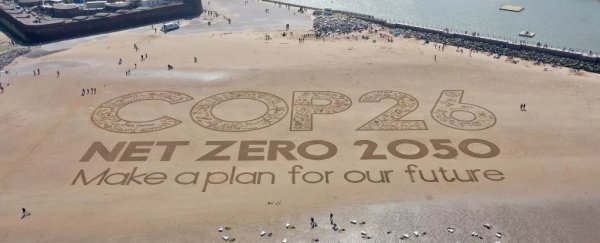The United Nations Climate Change Conference of the Parties (COP26) begins on Sunday 31 October in Glasgow, and the outcome may determine whether the world moves closer to a net-zero carbon economy by 2050.
The climate conference will bring together delegates from around the world to discuss their plans for reducing emissions and limiting climate change.
The key question is whether nations will expand their commitment to the Paris Agreement, an international plan set in 2015 that aims to keep global warming below 2 degrees Celsius (3.6 degrees Fahrenheit) above pre-industrial levels, and preferably below 1.5 C (2.7 F) by 2100.
Though 197 parties to the 2015 conference agreed to the Paris Agreement, commitments by nations to reduce emissions are not sufficient to stabilize the climate below 1.5 C.
Climate scientists say that to reach this goal, the globe would need to rapidly shelve fossil fuels as an energy source, achieving a 45 percent reduction over 2010 levels by 2030 and hitting net zero in 2050.
Politicians within member nations have not always been as committed as the original signers of the agreement: In 2019, the United States exited the Paris Agreement under President Donald Trump, Live Science reported. President Joe Biden re-committed to the agreement upon taking office in 2021.
Related: 10 Signs Earth's climate is off the rails
The goals of COP26, according to the organizers, are to get countries to agree to plans for ambitious reductions in greenhouse gas emissions by 2030; to work together to support adaptation to climate change that has already occurred; to mobilize developed countries to provide US$100 billion in climate finance per year for investment in global net zero, meaning the amount of emissions we produce is no more than the amount removed by the atmosphere.
The final goal would be to finalize the Paris Rulebook, the step-by-step guide on reaching the Paris Agreement.
The COP meeting happens every year (this year's is the 26th ever). But eyes are on this year's conference: As part of the Paris Agreement, countries agreed to provide an update every five years on their highest ambitions for reducing emissions.
That should have occurred in 2020, but that year's COP meeting was delayed by the coronavirus pandemic. Thus, those updates will occur in Glasgow this year.
All countries are also asked to provide an "Adaptation Communication", which will outline the challenges that each faces in adapting to a changing climate, and what they plan to do to overcome those hurdles.
Nations, especially developed nations, will also be asked to put their money where their mouth is. The Paris Agreement committed developed countries to raising US$100 billion each year to help developing countries finance their climate goals.
According to the intergovernmental Organisation for Economic Cooperation and Development (OECD), developed nations provided a joint total of $78.9 billion in financing in 2018.
The delegates to COP26 will also attempt to finalize the Paris Rulebook, much of which was formally adopted in 2018 at the UN COP24 conference in Poland. But there are still a few outstanding guidelines at play. One of the most crucial outstanding issues is that countries still need to agree upon how to ensure that emissions reductions aren't double-counted.
Part of the structure underpinning the Paris Agreement is carbon markets: Countries or companies that have a hard time reducing emissions, like airlines, can buy emissions credits from companies that are more capable of reducing emissions. This should create a balance that keeps overall emissions low.
But it's very easy for double-dipping to occur: Imagine if a US-based company like Amazon converted its delivery vans to electric-only. Both Amazon and the US might try to claim carbon credits for the resulting reduction in emissions. Without clear rules preventing this, the carbon markets could end up enabling more emissions, not fewer, according to climate policy experts.
There are signs that COP26 faces strong headwinds in meeting these goals. Leaked documents acquired by the BBC reveal that some developed nations are lobbying against the financial goals and hoping to downplay the need to move away from fossil fuels.
Related Content:
Images of melt: Earth's vanishing ice
The reality of climate change: 10 myths busted
Time-lapse images of retreating glaciers
This article was originally published by Live Science. Read the original article here.
